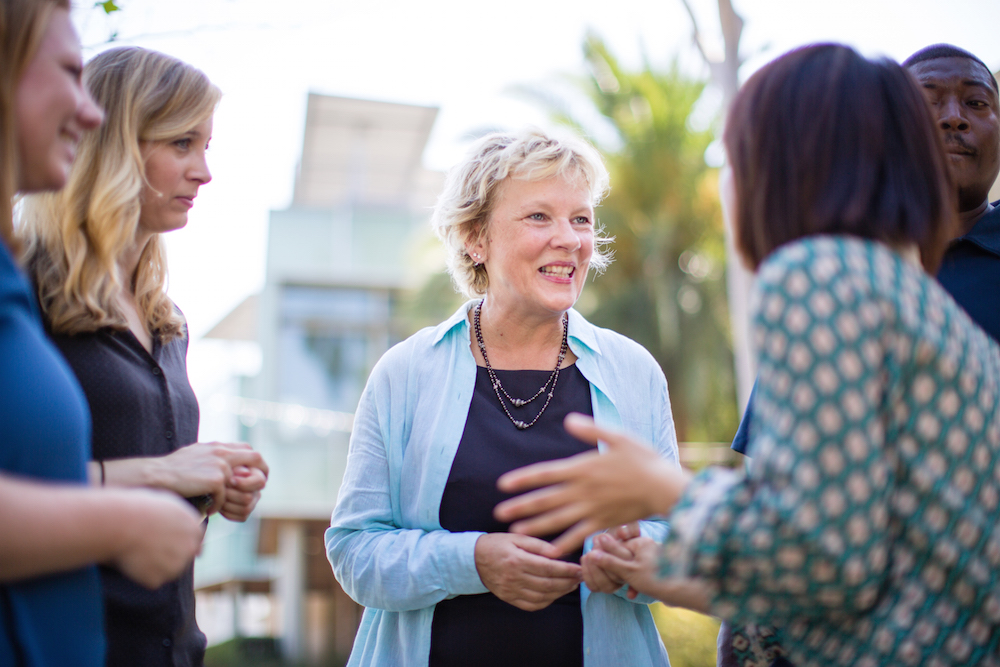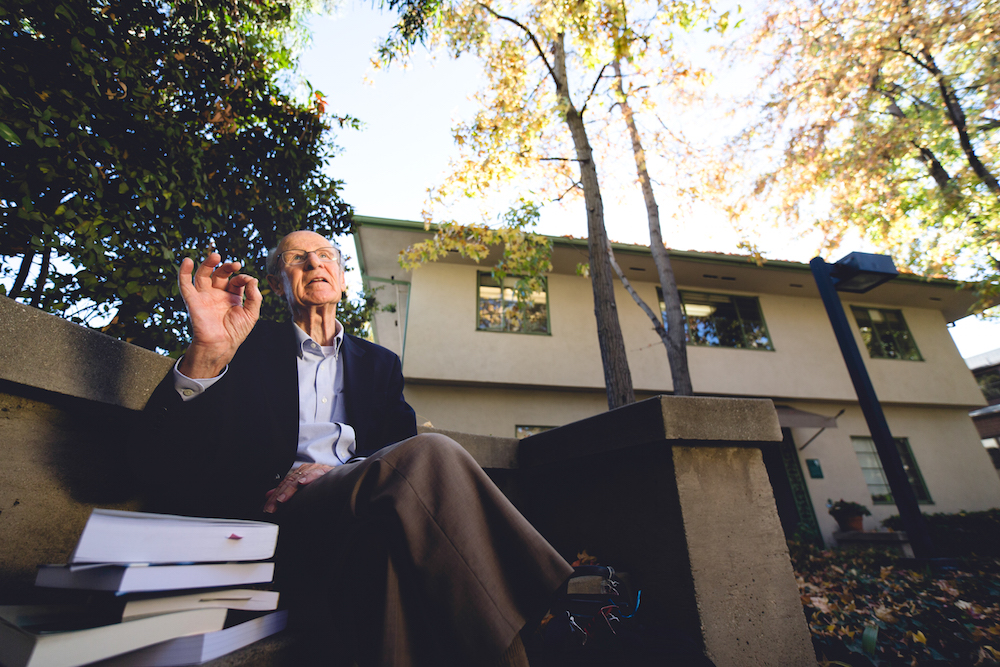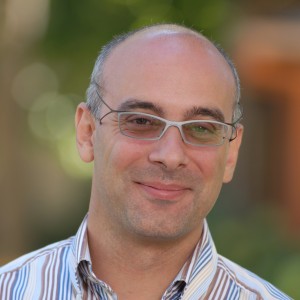“Christians and Muslims need to understand one another. We all know that certainly since the turning of the millennium and all the events that have happened since that time, there have been many reasons that the public conversation about Christianity and Islam has garnered all kinds of attention. Some of it has been helpful, but the vast majority of it, in my view, has largely been about stereotyping and insult and even war rather than mutual understanding, peace, respect, and justice.”
+ Mark Labberton, president of Fuller Seminary, from his introduction to the FULLER dialogues, an ongoing series of conversations at Fuller Seminary. Below Labberton moderates a conversation between Muslims and Christians with Jihad Turk, president, Bayan Claremont Islamic Graduate School; Evelyne A. Reisacher, associate professor of Islamic studies and intercultural relations at Fuller; J. Dudley Woodberry, dean emeritus and senior professor of Islamic studies at Fuller; Faisal Qazi, president, Medical Network Devoted to Service; Duaa Alwan, certified speaker, Muslim Speaker Network; and Michal Meulenberg, Fuller PhD student and cofounder of Miss Understanding.
“We really have to examine our rhetoric; it’s not good enough to only be politically correct. You have to be genuine in what you’re asking and what you’re sharing and what you want to learn.”
+ Duaa Alwan, a local Muslim scholar, reflects on public issues of religion and hijabs for “FULLER dialogues: Muslims & Christians,” a conversation among Fuller faculty and students and leading Muslim scholars in Southern California. Marked by both hospitality and respect, the dialogues were part of Fuller’s historic commitment to Christlike engagement with Islam.
“Yes, these are scary times both abroad and at home, but as peoples of faith we can not only love God with all our hearts—we can also love our neighbors and build together, on our common values and commitment to God and faith, a better society at home and around the world.”
+Jihad Turk, former Imam and president of Bayan Claremont Islamic Graduate School, from his lecture at FULLER dialogues. Listen to his lecture and Evelyne Reisacher‘s lecture here in part 1 of 2:
+Listen to panelists here in part 2 of 2:
“Sometimes if there is a tension, it seems to latch onto a theological discussion when it’s really an interpersonal problem. We were not listening carefully or understanding each other carefully enough, and it manifested itself in a theological issue that it wasn’t ultimately about.”
+Michal Meulenerg, a current PhD student, reflecting on her close friendship with a Muslim during the FULLER dialogues event. Learn more about her work with Christian-Muslim friendships here.
“These remarks are wonderful because they’ve opened a channel of communication. George Bernard Shaw said, “the single biggest problem of communication is the illusion it has taken place.” For us, it is a never ending process; the dialogue is just beginning and not concluding in any way.”
+ Faisal Qazi, a doctor and founder of MiNDS (Medical Network Devoted to Service), from the FULLER dialogues event.
+ The quotes above are all taken from the “FULLER dialogues: Muslims & Christians” event, which was held at Fuller’s Pasadena campus in April 2016.
More from the Fuller community

“I have lived with the Muslim community in the Parisian suburbs for decades. I have experienced the tension and interacted with conflicts in some neighborhoods; I have seen the despair and the ghettoization. I have also experienced strong and genuine relationships with Muslims who have expressed so much care and hospitality toward me that I was sometimes ashamed that Christians were not attending to them with similar generosity. To me, neighborly love is necessary to address the tough issues: the lack of justice, freedom of religion, social conflict, religious dissonance, and acts of terrorism. God chose the way of love and the way of entering into relationship with us through Christ in order to address these very same challenges. His example reveals that love is not limited to words—it should also be experienced in real relationships, with ups and downs and patient negotiations. This love is not afraid of conflicts that are naturally embedded in human relationships.”
+ from Evelyne Reisacher, associate professor of Islamic studies and intercultural relations, in her speech “Uniqueness of Christ and Muslims in Europe” at the Lausanne European leaders meeting in Switzerland, 2014. Listen to her plenary lecture at the 2015 Urbana Student Conference below. Her new book, Joyful Witness in the Muslim World, will be released this summer.

“As Christians, we are enjoined to love God and love people. Part of the love of both is sharing the gospel, drawing more people to God through Jesus Christ. Muslims are people—they are people God loves. It’s not that God will love them when they become Christians; God loves them now. We are called to do the same. How can we love them if we don’t know about them?”
+ Dudley Woodberry, dean emeritus and senior professor of Islamic studies at Fuller’s School of Intercultural Studies, reflecting on a lifetime of work with Muslim communities. Read his story from FULLER magazine here.
“The religious will fear to engage in dialogue, lest it force them to compromise, whereas the secular will shun it as a platform for the assertion of exclusion. The relativist will use dialogue to flatten out differences, whereas the absolutist will use it to demonstrate the superiority of their own views. I would like to suggest that these two opposite positions stand in fact at the end of a spectrum of potential positions and attitudes. Christian interaction with Islam need not be limited to a position of either syncretism or polemics.”
+ Martin Accad, affiliate associate professor of Islamic studies, on a “kerygmatic” approach that emphasizes empathic listening and a positive proclamation of the gospel. From the book Toward Respectful Understanding and Witness Among Muslims: Essays in Honor of J. Dudley Woodberry.
- A classical approach to Islam
- The lens of social sciences
- The realities of local and global ministries
+ These are the three pillars that support a well-rounded education in Islamic Studies according to Fuller’s scholars. Learn more about the Islamic Studies Emphasis here.
“Every Muslim is a human being—just like you and me. Every human being is created in the image of God and has the capacity to cry out to God. So we have to realize we’re on holy ground talking to Muslims, and they’re all potential members of the kingdom. . . . When you can talk about the kingdom and about Jesus and you can pray with Muslims who long to be prayed for, it gets to the matter of the heart and of human interaction with the Other and beyond the group and class mentalities which have so separated us.”
+ An adjunct professor in the School of Intercultural Studies, from the prospective student event “Islam: A Christian Perspective.”
“I think that Muslims do worship the same God as Christians, but that doesn’t mean that Muslims have the same beliefs about God as Christians. Clearly there are deep differences between us as I’ve tried to indicate, but it does mean we do our Muslim sisters and brothers a disservice if we maintain they don’t worship the same God. And it may be a means of fruitful dialogue with Muslims as well as a way for us Christians to build relationships with Muslims. After all, if we share a belief in the same God—a God we both worship—then we have a lot in common. It may be that we can use that as basis for exploring our differences towards greater understanding between us. . . . it seems to me that there is much to be gained from such a dialogue—a gain in fact that will enrich all of our lives as a consequence.”
+ Oliver Crisp, professor of systematic theology, from the prospective student event “Islam: A Christian Perspective.”
“We have a mandate to love God and to love our neighbor and care for the stranger. I think we have to continue reminding the church and educating the church through intercessory prayer and Christian activism and a lot of patience. We live in a culture that’s afraid of the stranger. And we live in a time right now where it’s ‘us versus them.’ It is at this moment that the church has to bear witness to who we are and how we’re different from the rest of the world in how we see the least of these and the marginalized.”
+ Lisseth Rojas-Flores, associate professor of marriage and family therapy, from the prospective student event “Islam: A Christian Perspective.”
+ from the “Songs for Peace Project,” a Templeton-funded initiative from Roberta King, associate professor of communication and ethnomusicology, and the Brehm Center for Worship, Theology, and the Arts. The project facilitated dialogues between Muslims and Christians through the use of hymnody and folk music. Learn more about the project here.
Further Reading
Peace-Building by, between, and beyond Muslims and Evangelical Christians*
Mohammed Abu-Nimer and David Augsburger (Lexington Books, 2010)
Senses of Devotion: Interfaith Aesthetics in Buddhist and Muslim Communities
William A. Dyrness (Cascade Books, 2013)
Earth, Empire and Sacred Texts: Muslims and Christians as Trustees of Creation
David Johnston (Equinox Publishing, 2013)
(un)Common Sounds: Songs of Peace and Reconciliation among Muslims and Christians
Roberta R. King and Sooi Ling Tan, eds. (Cascade Books, 2014)
Connecting with Muslims: A Guide to Communicating Effectively
Fouad Masri (IVP Books, 2014)
Joyful Witness in the Muslim World: Sharing the Gospel in Everyday Encounters
Evelyne Reisacher (Baker Academics, 2016)
Toward Respectful Understanding and Witness among Muslims: Essays in Honor of J. Dudley Woodberry
Evelyne Reisacher, ed (William Carey Library, 2015)
Christian. Muslims. Friend: Twelve Paths to Real Relationship
David Shenk (Herald Press, 2014)
Understanding Insider Movements
Harley Talman and John Jay Travis (William Carey Library, 2015)
A Textual History of Christian-Muslim Relations: Seventh-Fifteenth Centuries
Charles Tieszen (Fortress Press, 2015)
Allah: A Christian Response
Miroslav Volf (HarperOne, 2012)
Muslims and Christians on the Emmaus Road: Crucial Issues in Witness Among Muslims
J. Dudley Woodberry (Missions Advanced Research, 1989)
From Seed to Fruit: Global Trends, Fruitful Practices, and Emerging Issues among Muslims
J. Dudley Woodberry, Ed (William Carey Library, 2011)
Muslim and Christian Reflections on Peace: Divine and Human Dimensions
J. Dudley Woodberry and Osman Zümrüt (UPA, 2005)
Resources for Peacemaking in Muslim-Christian Relations: Contributions from the Conflict Transformation Project
J Dudley Woodberry and Robin Basselin (Fuller Seminary Press, 2006)
*This volume coedited by Fuller professor David Augsburger is the first published book to include the words ‘”Evangelical” and “Muslim” in the title—a sign of Fuller’s leadership in Islamic Studies.
For a deeper description of these volumes and their significance, go here.
Available Classes
Introduction to Islam
Muslim Peoples: A Sociological Approach
History of the Muslim-Christian Encounter
Current Trends in Islam
Shariah and Human Rights
The Qur’an and Theological Themes
Music, Peacebuilding, and Interfaith Dialogue
Models of Witness in Muslim Contexts
Popular Islamic Piety
Muslim Women and Family
Qur’anic Arabic
+ learn more about Fuller’s Islamic Studies Emphasis here and the Certificate in Islamic Studies here.

